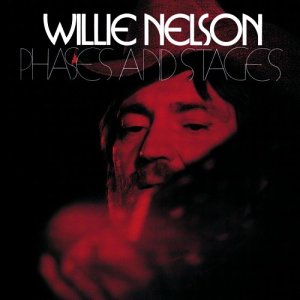
Red Headed Stranger is the 18th studio album by American outlaw country singer Willie Nelson, released in 1975. Following the success of his recordings with Atlantic Records, coupled with the negotiating skills of his manager, Neil Reshen, Nelson signed a contract with Columbia Records, the label that gave him total creative control over his works. The concept for the album was inspired by the "Tale of the Red Headed Stranger", a song that Nelson used to play as a disc jockey on his program in Fort Worth, Texas. After signing with Columbia, he decided to record the song, and arranged the details during his return to Austin, Texas, from a trip to Colorado. It was recorded at low cost at Autumn Sound Studios in Garland, Texas. The songs featured sparse arrangements, largely limited to Nelson's guitar, piano, and drums. Nelson presented the finished material to Columbia executives, who were dubious about releasing an album that they at first thought was a demo. However, Nelson had creative control, so no further production was added.

Stardust is the 22nd studio album by Willie Nelson, released in April 1978. Its ten songs consist entirely of pop standards that Nelson picked from among his favorites. Nelson asked Booker T. Jones, who was his neighbor in Malibu at the time, to arrange a version of "Moonlight in Vermont". Impressed with Jones's work, Nelson asked him to produce the entire album. Nelson's decision to record such well-known tracks was controversial among Columbia executives because he had distinguished himself in the outlaw country genre. Recording of the album took only ten days.

Shotgun Willie is the sixteenth studio album by Willie Nelson, released in 1973. The recording marks a change of style for Nelson, who later stated that the album "cleared his throat". When Nelson refused to sign an early extension of his contract with RCA Records in 1972, the label decided not to release any further recordings. Nelson hired Neil Reshen as his manager, and while Reshen negotiated with RCA, Nelson moved to Austin, Texas, where the ongoing hippie music scene at the Armadillo World Headquarters renewed his musical style. In Nashville, Nelson met producer Jerry Wexler, vice president of Atlantic Records, who was interested in his music. Reshen solved the problems with RCA and signed Nelson with Atlantic Records as their first country music artist.

Phases and Stages is the seventeenth studio album by Willie Nelson, which followed the moderate success of his first Atlantic Records release, Shotgun Willie. Nelson met producer Jerry Wexler at a party where Nelson sang songs from an album he planned to record. The single "Phases and Stages" was originally recorded the same year. Nelson recorded the album at Muscle Shoals Sound Studios in two days and Wexler produced it.

Smiler is the fifth studio album by English rock singer-songwriter Rod Stewart. It was released on 4 October 1974 by Mercury Records. It was his first album to be critically panned. It reached number 1 in the UK album chart, and number 13 in the US. The album was largely considered to be an unadventurous retread of what he had done before, including covers of Chuck Berry, Sam Cooke and Bob Dylan songs, as well as a duet with Elton John of John's song "Let Me Be Your Car". Stewart's one attempt at adventurousness was a cover of Carole King's "(You Make Me Feel Like) A Natural Woman" where 'Woman' is switched to 'Man'. This track was selected for special derision by critics. The release of the album itself was held up for five months due to legal problems between Mercury Records and Warner Bros. Records.

Move It On Over is the second album by George Thorogood and the Destroyers, released by Rounder Records in 1978. The album contains all cover material. Its title track, Hank Williams' "Move It On Over", received major FM radio airplay when released, as did the Bo Diddley cover, "Who Do You Love?"

Lonesome, On'ry and Mean is an album by American country music artist Waylon Jennings, released on RCA Victor in 1973. It was, after Good Hearted Woman and Ladies Love Outlaws, the third in a series of albums which were to establish Jennings as one of the most prominent representatives of the Outlaw country movement. Photographer Mick Rock shot the album's cover.

Wanted! The Outlaws is a compilation album by Waylon Jennings, Willie Nelson, Jessi Colter, and Tompall Glaser, released by RCA Records in 1976. The album consists of previously released material with four new songs. Released to capitalize on the new outlaw country movement, Wanted! The Outlaws earned its place in music history by becoming the first country album to be platinum-certified, reaching sales of one million.

Waylon & Willie is a duet album by Waylon Jennings and Willie Nelson, released by RCA Records in 1978. In the US, it stayed at #1 album on the country album charts for ten weeks and would spend a total of 126 weeks on the country charts.

I Am the Blues is the sixth studio Chicago blues album released in 1970 by the well-known bluesman Willie Dixon. It is also the title of Dixon's autobiography, edited by Don Snowden.

The Sound in Your Mind is the nineteenth studio album by country musician Willie Nelson. This was his second album for Columbia Records.

Muddy "Mississippi" Waters – Live is a live album by Muddy Waters. It was recorded during the tour to support Muddy Waters' album Hard Again and it features the same musicians, including James Cotton and Johnny Winter, who had produced the album.

Sings Kristofferson is the twenty-third studio album recorded by Willie Nelson in 1979 consisting of all covers of Kris Kristofferson songs. It reached #5 on the US Country albums chart, #42 on the US Pop albums charts, and was certified gold in Canada and platinum in the US. The cover is very simple, a single picture of Nelson's face against a black background, with the song titles to the right of his face. The back cover is the same background with both Nelson and Kristofferson's faces together.

To Lefty From Willie is the twenty-first studio album by country singer Willie Nelson. Recorded in 1975, the album sat in the vaults of Columbia Records until 1977. This album is Willie Nelson's tribute to fellow country singer Lefty Frizzell.

Yesterday's Wine is the thirteenth studio album and a concept album by country singer Willie Nelson. Nelson had been recording for RCA Victor since the early 1960s, and had no significant hits. By 1970, his recordings had reached mid-chart positions. Nelson lost the money from his song-writing royalties by financing unsuccessful concert tours that were generally unprofitable. In addition to problems with his music career, Nelson had problems in his personal life. He had divorced his wife, Shirley Collie, and his Tennessee ranch had been destroyed by a fire.

Rainbow Connection is the forty-ninth studio album by country singer Willie Nelson. It was recorded in December 2000 and January 2001 at Willie's ranch near Spicewood, TX. Willie’s daughter Amy Nelson was just five years old when she first heard Kermit the Frog sing “Rainbow Connection” in The Muppet Movie, and she spent the next twenty years trying to talk her dad into recording it. In 2001, he finally did, with Amy—an accomplished musician in her own right—co-producing.

Call Me is the sixth album by soul singer Al Green. It is widely regarded as Green's masterpiece, and has been called one of the best soul albums ever made. In 2003 the TV network VH1 named it the 70th greatest album in any genre. Call Me was a Top 10 Billboard Pop Album, and the third #1 Soul Album. In 2003, the album was ranked number 289 on Rolling Stone magazine's list of the 500 greatest albums of all time, and 290 in a 2012 revised list. Praised for his emotive singing style, Green here incorporates country influences, covering both Willie Nelson and Hank Williams. This album contained three top 10 singles on the Billboard Hot 100: "You Ought to Be with Me," "Here I Am " and "Call Me ."

The Best of Willie Nelson is a compilation album released in 1973. It contains all 12 tracks from his first two albums, And Then I Wrote, plus "Half A Man" from Here's Willie Nelson.

Doug Sahm and Band is the debut solo album of American singer-songwriter Doug Sahm. In 1972, after leaving the Sir Douglas Quintet, Sahm moved to Austin, Texas. He was signed by Jerry Wexler to the newly opened country music division of Atlantic Records, and started the album sessions by October 1972. It featured appearances by Bob Dylan, Dr. John, David "Fathead" Newman, Flaco Jimenez, David Bromberg and Kenny Kosek.

One for the Road is an album by singers and songwriters Willie Nelson and Leon Russell, produced by the pair. The album was first released as a double vinyl LP by Columbia Records. The album was recorded in Leon's new facility, Paradise Studios in Burbank, California. The album peaked at No. 25 on the US Billboard 200 chart, No. 3 on US country albums chart, No. 28 on the Canada albums chart, No. 1 on the Canada country albums chart and No. 11 on the New Zealand albums chart. The album has gold certification for sales of over 500,000 albums in the US and Canada.




















